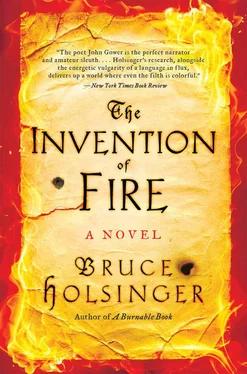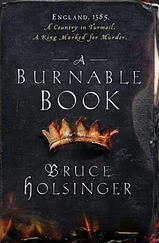Bruce Holsinger - The Invention of Fire
Здесь есть возможность читать онлайн «Bruce Holsinger - The Invention of Fire» — ознакомительный отрывок электронной книги совершенно бесплатно, а после прочтения отрывка купить полную версию. В некоторых случаях можно слушать аудио, скачать через торрент в формате fb2 и присутствует краткое содержание. Год выпуска: 2015, Издательство: HarperCollins, Жанр: Исторический детектив, на английском языке. Описание произведения, (предисловие) а так же отзывы посетителей доступны на портале библиотеки ЛибКат.
- Название:The Invention of Fire
- Автор:
- Издательство:HarperCollins
- Жанр:
- Год:2015
- ISBN:нет данных
- Рейтинг книги:3 / 5. Голосов: 1
-
Избранное:Добавить в избранное
- Отзывы:
-
Ваша оценка:
- 60
- 1
- 2
- 3
- 4
- 5
The Invention of Fire: краткое содержание, описание и аннотация
Предлагаем к чтению аннотацию, описание, краткое содержание или предисловие (зависит от того, что написал сам автор книги «The Invention of Fire»). Если вы не нашли необходимую информацию о книге — напишите в комментариях, мы постараемся отыскать её.
The Invention of Fire — читать онлайн ознакомительный отрывок
Ниже представлен текст книги, разбитый по страницам. Система сохранения места последней прочитанной страницы, позволяет с удобством читать онлайн бесплатно книгу «The Invention of Fire», без необходимости каждый раз заново искать на чём Вы остановились. Поставьте закладку, и сможете в любой момент перейти на страницу, на которой закончили чтение.
Интервал:
Закладка:
He gave me a long, catlike stare. I wondered what he knew, and whether my colloquy with Iseult had been overheard.
“Perhaps your renowned skills have left you, Gower.”
“Perhaps,” I said, sitting back. “Though I am certain there is nothing more to be learned, at least not in Desurennes.”
“You will return to London, then,” he purred.
“At first light, your lordship, or as close to it as I can manage.” Though I was on English soil I felt suddenly vulnerable and alone. Simon was supposed to have made contact himself, yet I did not think it wise to remain in Calais any longer, regardless of the chancellor’s wishes. Edmund Rune’s pursuit of his treasonous smuggler would have to do without me.
“Very well,” he said, seeming eager for my absence. We parted cordially, though I felt his eyes on my back as I walked out of the hall. One coin slipped to a sailor and he could have me tossed off a boat half a league from shore, to sink like a stone in the sea.
Curfew was ringing by the time I left the keep. Calais took its evening bell less seriously than London did, it seemed, despite the town’s militant posture, regarding it more as a warning than a sentence. There were several evening gathering places within the walls, one of them between the church of St. Nicholas and Stapler’s Hall, where at least a hundred townsmen milled about. On my way back to Broussard’s I passed through the large square and left by way of Rigging Street, which cut off at an angle from the main thoroughfare in from the gate.
As the noise from the square faded I heard footsteps approaching from behind me. At first I thought nothing of their hurried patter. At the next corner I cast a glance over my shoulder. A lone figure was approaching. His face was hidden behind a cloak, only his eyes visible beneath the dark hood.
He saw me looking back. His pace quickened. I rounded the bend at a faster pace. I was on an oblong section of the street sided by two high walls providing no means of escape, nor any place to hide. Starting to run, I slipped on a slick spot and fell forward, jamming my arm. The pain spread from my elbow to my hand. As I struggled to my feet I heard the slap of my pursuer’s shoes on the pavers.
I glanced back as I staggered up. He was thirty feet away now. Twenty. His hand went to his belt. There was the flash of a blade. I half turned, making for the next street, cowering beneath my uninjured arm as I ran, expecting a thrust between the shoulder blades at any moment.
Another sound, from off to my left. A grunt, hurrying feet, an impact.
“Ohf!”
Sounds of a struggle, then silence.
I looked back. In the middle of the widened part of the street a man bent over my hooded pursuer, now prostrate on the ground. Still, perhaps dead. The other man was patting his sides and front, searching him.
I did not stay to see the result. I rounded the next corner, but now the second man was chasing me. In my state I had no strength to resist him. A hand clutched my injured arm. He had me. Yet I turned into him, hand balled into a fist, prepared to defend myself with my good arm.
“Father!”
He threw me against the wall, and I felt the blood drain from my face.
Even in the near darkness Simon’s countenance was as familiar a sight as my own hand, though it had changed for the worse. A new and whitened scar ran down from his forehead through his left cheek, ending in an ugly star-shaped mark just above the line of his chin. A bark of French from the square, more running.
“The watch,” Simon whispered fiercely. “We cannot talk here. Come.” Still grasping my arm, he ducked beneath a slanted beam and took me down a narrow alley and through a series of linked passages winding snakelike through the buildings around us. It was a part of the sea town left untouched by King Edward’s renovations, a labyrinth of hidden courts, odd corners, and sudden staircases that quickly took us out of reach of the watchmen.
Soon we arrived at a tall, narrow house to one side of a small courtyard. We climbed three flights of stairs to a low door that had been left open to the night. Simon closed it behind us, then with some effort flinted up a flame.
My son, still short of his twenty-fourth year, looked well above his thirtieth. Simon had aged in the mere fifteen months since I saw him last, leaning over me at night, staggering across the priory yard with the fate of a kingdom clutched in his hands. His face was gaunt, with a greyish cast to his skin, which sat too taut over the visible bones of his face. He had lost much of the physical grace that once distinguished him. Even in his worst moments Simon would always be at ease with himself and those around him. Now he was shaky and restless, as if his limbs were animated by some maddening ague.
Attending to my throbbing arm appeared to calm him somewhat. I sat silently as he bandaged the limb. He seemed practiced at it, as if used to repairing the minor injuries of his companions in stealth, and I let him do what he would without complaint.
“Not broken, certainly,” he said. “A minor sprain of the wrist. Keep it bound for several days.”
I could not look at him and instead gazed around the chamber. No hearth and thus no fire in these upper rooms, only a thin clutch of greased rushlights, the weak flame casting our distorted forms against the close walls and low ceiling. When he had finished with my arm he sat across from me. His leg worried the seat of his chair. He reached up constantly to wipe a palm over his brow, which was not moist, though in his agitated state he seemed if anything feverish and ill. His eyes shifted right and left.
“Who was that man?” I finally asked. My first words to Simon since that night at the priory house.
“You don’t know?” His voice was hollow, with no resonance or depth, as if coming from behind a muslin cloth.
I shook my head.
“He was your traveling companion. He sailed with you from London.”
I thought for a moment. “The cloth merchant?”
Simon stared at the rushlight. “He is no cloth merchant, Father.”
“You know him?”
“We have met,” he said darkly. “He was a killer for coin, with twenty knifings to his credit. His target tonight was you.”
“Apparently.”
“I am more than glad that he failed.”
“I should hope so,” I said, and he looked away, his leg bouncing anew. Simon had just saved my life. Yet why did I suspect he had also had a hand in jeopardizing it?
“I have been following you since your arrival from London,” he said, almost shyly.
“How did you know I was coming to Calais?”
“I didn’t know, not in advance,” he said. “But I have men at the docks and generally receive word upon the arrival of passengers, particularly newcomers to the Pale. I was as surprised to hear of your disembarkation as you were to see me tonight. I didn’t think you would come.”
“You learned where I have been?”
“From one of the servants of Broussard. You went looking into the killings at Desurennes.”
“Yes.”
“What have you learned?”
I scoffed. “What reason would I have to tell you anything I’ve learned?”
“None,” he admitted. He tapped a finger. “Though surely you suspect some connection to this business with Gloucester and Snell.”
A name I had heard any number of times in recent weeks. “The king’s armorer,” I said.
“He is a longtime ally of Gloucester’s,” said Simon, his tone subtly changing. “That is why I contacted the chancellor, Father, and asked to speak with you, and only you. Snell is not simply laying in powder and weapons for the Tower and the crown. He has become a notorious trader in arms against the interests of England. I’ve learned that he is selling saltpetre to Burgundy and France by the barrel.”
Читать дальшеИнтервал:
Закладка:
Похожие книги на «The Invention of Fire»
Представляем Вашему вниманию похожие книги на «The Invention of Fire» списком для выбора. Мы отобрали схожую по названию и смыслу литературу в надежде предоставить читателям больше вариантов отыскать новые, интересные, ещё непрочитанные произведения.
Обсуждение, отзывы о книге «The Invention of Fire» и просто собственные мнения читателей. Оставьте ваши комментарии, напишите, что Вы думаете о произведении, его смысле или главных героях. Укажите что конкретно понравилось, а что нет, и почему Вы так считаете.












